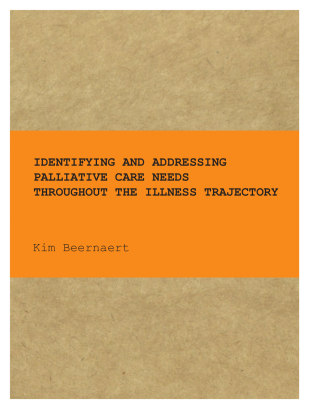Author: Kim Beernaert
Date: 24-06-2015
Promotor: Prof. dr. Joachim Cohen and Prof. dr. Luc Deliens
SUMMARY OF THE DISSERTATION
Background
The World Health Organization (WHO) has promoted palliative care as the preferred approach to care for people suffering from a chronic lifelimiting (or life-treatening) illness. The WHO further states that this approach should be initiated early in the illness trajectory. However, in practice and in research emphasis is mainly put on specialist palliative care services (rather than early generalist palliative care approaches), on people affected by cancer (rather than other life-limiting illnesses that might be amenable to palliative care) and on advanced stages of the disease (instead of looking at possible benefits of palliative care for people at earlier phases). It is of major importance to extend the currently available research of palliative care needs and care for patients with life-limiting illnesses throughout the disease course to develop a better understanding of these needs and care that can lead to better care and, consequently, better quality of life.
Methods
To do this we used four robust research methods: 1) qualitative interviews and focus groups with patients, family physicians and community nurses, 2) a survey in cancer patients on their care needs, 3) a nationwide survey in family physicians on the care in the last three monts of life delivered to their patients, and 4) a population-based physician survey on the use of specialist palliative care services.
Results
By using these methods, this dissertation gives insight into the palliative care needs of patients with cancer, COPD, heart failure and dementia from diagnosis onwards, the tasks and roles in recognizing and handling palliative needs by the family physician throughout the illness trajectory and the use (or lack thereof) of specialist palliative care services by people dying with chronic lifelimiting illnesses.
Conclusions
The findings in this dissertation can be used as an important framework to support, promote and develop an integration of a palliative care approach early into the care continuum.

